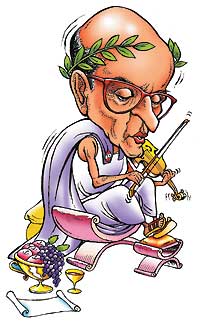 Girija Prasad Koirala moved out of Baluwatar nearly two years ago when he still had a majority in parliament and his parliamentary party. For nine months, he's been at the forefront of the movement to preserve the gains of the Jana Andolan. Yet most of us think the kangresi patriarch is primarily responsible for the current state of the nation (Nepali Times/Nepalnews.com Inernet Poll #150). We must be real angry.
Girija Prasad Koirala moved out of Baluwatar nearly two years ago when he still had a majority in parliament and his parliamentary party. For nine months, he's been at the forefront of the movement to preserve the gains of the Jana Andolan. Yet most of us think the kangresi patriarch is primarily responsible for the current state of the nation (Nepali Times/Nepalnews.com Inernet Poll #150). We must be real angry. What is so nauseating about the man that we can't even give him the respect a senior citizen deserves? The realisation that no monarchy-constitutional or absolute-has room for two dynasties? Koirala's all-in-the-family demeanour where real power rarely flows along the most democratic party's organisational chart? The dubious fund-raising tactics kangresis couldn't have adopted without his concurrence?
Koirala's worst critics praise his strong organisational skills. Not enough of his supporters ponder how he still has them in his eightieth decade on the planet.
Candour sets him apart from the crowd. Koirala's celebration of the restoration of multiparty democracy as a victory for the panchas as well was only the beginning. He was the first prominent politician to acknowledge that political parties were too busy trying to overthrow the panchas to think up a way of doing things better. He regretted having thrown the zonal commissioners along with Panchayat bath water. A prime minister battling to restore law and order could forget his anchaladhish-inflicted tribulations to appreciate the administrative sturdiness of the office.
By pitting Govinda Raj Joshi against Ram Chandra Poudel in Tanahu, Bal Dev Sharma Majgaiya against Khum Bahadur Khadka in Dang and Ram Sharan Mahat against Arjun Narsingh KC in Nuwakot, Koirala bred factionalism in a party complacent in its exceptionalism. Handled properly, intra-party warfare could have fostered democratic competition right down to the district level.
Surya Bahadur Thapa may have conceived the broader democratic alliance, but Koirala gave it a context. (Would the RPP ever have been able to publicise the platform in such a big way?) Most of us jeered when Koirala said the Nepali Congress' 113 MPs amounted to nothing. With the entire lower-house membership having come to naught, the joke's on us.
Many Nepalis who agree with Koirala's message can't quit suspecting his motives. With an eye on his legacy, couldn't he be genuinely concerned about the country this time. Consider some of Koirala's post-October Fourth moves. The man has gone to over 60 districts railing against the perils of royal assertiveness. Of the major post-1990 players, he's come the closest to acknowledging his mistakes, with the strict proviso that the rest accept their full share. After Sher Bahadur Deuba's boys hurled those projectiles on home turf, Koirala maintained a dignified silence until he called his former prot?g? for an update on his health. Deuba's presence at the palace meeting rankled Koirala not because of the intrusion. He still can't figure out who's shielding whom. (Remember what we were discussing around this time last year?)
Why didn't Koirala expose the "grand design" in an early-morning address to the nation on 2 June, 2001? Because, he says, he wanted to avoid further turmoil. Doesn't sound like a bad reason. How many column inches did that assertion get in the papers?
It was a little jarring to see Koirala chairing a special session of the dissolved parliament at the Royal Nepal Academy days after he went to the Supreme Court to bypass the CIAA. In retrospect, maybe we missed the connection. The post-October Fourth fight is a political one. Koirala's battle with the CIAA is constitutional.
His demand that the army be brought under the elected government's control had started sounding devoid of national-security sensitivities. Given the timing, it looked like a shrewd move to deflect the generals' ire at the kind of slogans being raised on the streets.
But, then, who was the first non-ex-pancha to come out in defence of the troops' right to unrestricted movement? If Koirala and the commander-in-chief can see eye to eye on national issues, not all hope is lost.
Each time Koirala comes back from Biratnagar, Kathmandu politicos know he has something up his sleeves. His impatience with the communists' timidity before royalty may have a larger meaning. Koirala probably read last week's poll saying that only one in 20 Nepalis blame Madhab Kumar Nepal for the country's mess. He certainly knows that the UML general secretary served nine months in power with the official designation of deputy premier. If you can't stand the heat, stay out of the kitchen. By the way, how does Koirala feel about us?


